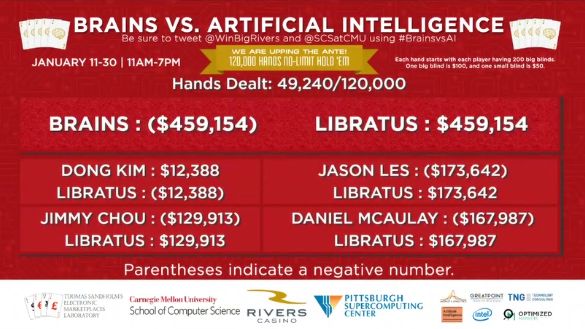| AI Prevails Against Human Poker Champions |
| Written by Sue Gee | |||
| Saturday, 21 January 2017 | |||
|
Libratus, an artificial intelligence developed at Carnegie Mellon, is currently taking on four of the world's best professional poker players in a 20-day match at the Rivers Casino in Pittsburgh, in which 120,000 hands of No Limit Texas Hold'em will be played.
A lot is at stake at the Rivers Casino. The four poker pros, Jason Les, Dong Kim, Daniel McAulay and Jimmy Chou will split a prize purse of $200,000, which will be awarded even if Libratus wins. On the other hand the AI creators, Professor Tuomas Sandholm and Ph.D. student Noam Brown hope to prove that Libratus, to which15 million core hours of computation at the Pittsburgh Supercomputing Center (PSC) have been devoted, can beat the top high-stake players of the game The contest began on January 11th and is billed as a re-match as it follows a similar event in 2015 in which Claudico, a previous poker-playing algorithm from Carnegie Mellon, lost by $732,713 after 80,000 hands played over two weeks. Given that $170 million had been bet losing by less than a million dollars was close enough to be considered a draw, so this time more games are being played to ensure a statistically significant result.In addition, to ensure that the outcome of the competition is not due to luck, the four pros will be paired to play duplicate matches — Player A in each pair will receive the same cards as the computer receives against Player B, and vice versa. One of the players in each of these pairs will play on the floor of the casino, while his counterpart will be isolated in a separate room.
As play got underway, Andrew Moore, Dean of Carnegie Mellon's School of Computer Science said: "A lot of people throughout the AI community are watching this event carefully. Beating some of the top players in the game would be a significant achievement for an AI and will only be possible if Libratus can successfully bluff and otherwise mislead its human opponents". In this video about the Brains vs AI event Professor Sandholm and Noam Brown, explain why this kind of poker is a benchmark when it comes to artificial intelligence and how their algorithms can be used in a wider set of situations:
Brown refers to the success computers have experienced in the perfect information games of Chess and Go and points out that Poker is closer to real world situations that have to deal with hidden information and uncertainty. He explains that AlphaGo wouldn't know how to bluff and would be easy to beat at Poker noting that: "the element of uncertainty changes the dynamic completely and it is this element that Liberatus and the algorithms developed for it are addressing. Sandholm reminds us that Limit Texas Hold'em was actually near-optimally solved in 2015 by the University of Alberta (see Poker Sorted - Meet Cepheus) and goes on the describe the No Limit version as: "the last frontier in the foreseeable horizon of game solving in AI." He also notes that the Libratus AI is not specifically a poker program. Its algorithm could be applied to any number of situations that involve incomplete and misleading information — business negotiations, military strategy, cybersecurity and even medical treatment design. The wider implication of the Brains vs. AI match is that Libratus goes towards being a General Artificial Intelligence that can address any situation that it runs into, not just a specific domain like Go or Poker. As Brown puts it: If AI is going to achieve this goal it will need to address uncertainty which comes up a lot in real life. We see the algorithms used in this bot as advancing the field for those problems, and tacking the question, "how do you deal with uncertainly in the real world?
So how is this historic match progressing? Prior to its start odds makers favored the human players 4 or 5 to 1 over Libratus. By the end of the first day however Libratus ended up ahead by $82,000. It repeated its success on the second and third days and lead by $193,000. On the fourth day, however the humans started winning and by the end of day six had shrunk Libratus' lead to just $51,000. At this point Jason Les, who also played in the 2015 contest against Claudico, emailed: We got off to a bad start, which I believe is kind of expected. Those first hands we play without any idea how our opponent plays and it took us a while to study and get an understanding of what was going on. Les hinted that the Poker pros had found weaknesses to exploit and were getting together each evening to develop strategies, At night while the humans sleep, however, Libratus goes back to the PSC where the Bridges computer performs computations to aid with its end-game play. This extra help seems to be paying off and Libratus is currently pulling ahead strongly. There's a live feed between the hours of 11:00 and 19:00 on the Brains vs Artificial Intelligence Site and you can catch up with matches on Twitch.tv
More InformationBrains vs Artificial Intelligence Site Related ArticlesAlphaGo Beats Lee Sedol Final Score 4-1 Why AlphaGo Changes Everything AlphaGo Revealed As Mystery Player On Winning Streak To be informed about new articles on I Programmer, sign up for our weekly newsletter, subscribe to the RSS feed and follow us on Twitter, Facebook or Linkedin.
Comments
or email your comment to: comments@i-programmer.info |
|||
| Last Updated ( Wednesday, 01 February 2017 ) |




